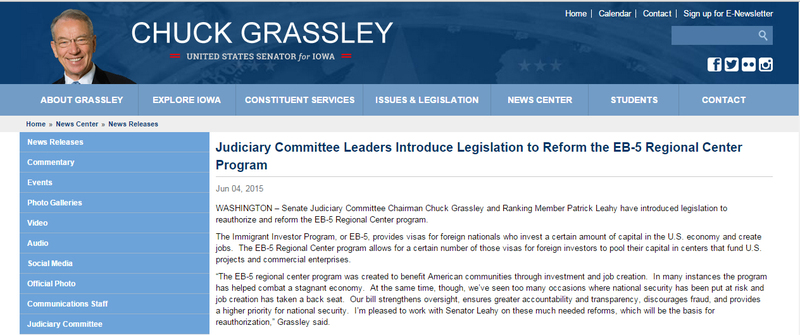Judiciary Committee Leaders Introduce Legislation to Reform the EB-5 Regional Center Program

Senate Judiciary Committee Chairman Chuck Grassley and Ranking Member Patrick Leahy have introduced legislation to reauthorize and reform the EB-5 Regional Center program.
The Immigrant Investor Program, or EB-5, provides visas for foreign nationals who invest a certain amount of capital in the U.S. economy and create jobs. The EB-5 Regional Center program allows for a certain number of those visas for foreign investors to pool their capital in centers that fund U.S. projects and commercial enterprises.
“The EB-5 regional center program was created to benefit American communities through investment and job creation. In many instances the program has helped combat a stagnant economy. At the same time, though, we’ve seen too many occasions where national security has been put at risk and job creation has taken a back seat. Our bill strengthens oversight, ensures greater accountability and transparency, discourages fraud, and provides a higher priority for national security. I’m pleased to work with Senator Leahy on these much needed reforms, which will be the basis for reauthorization,” Grassley said.
Grassley has conducted extensive oversight of the program over the last several years and was instrumental in alerting authorities about allegations brought forward by whistleblowers. Those worries stem from the fact that other federal agencies, including the FBI, had raised national security concerns with the approval of several EB-5 regional centers and visas for foreign investors, as well as allegations from the whistleblowers who said that requests from politically influential people were being expedited.
The Department of Homeland Security Inspector General substantiated the allegations of special access and favoritism for politically connected people. In addition, a Government Accountability Office report due out this summer is also expected to raise questions about the economic impact and the department’s ability to assess risks.
The bipartisan bill introduced today helps address some of those concerns. It bolsters the Department of Homeland Security’s authorities to administer the program, and provides investors with greater protections and more information about their investments. It also increases transparency and oversight and provides DHS the ability to proactively investigate fraud, both in the United States and abroad, using a dedicated fund paid for by certain program participants. The bill would also raise the amount of investment required and help to restore the program to its original intent, by ensuring that much of the capital generated and jobs created occur in rural areas and areas with high unemployment.
The American Job Creation and Investment Promotion Reform Act
• Provides increased authority to Homeland Security to deny or terminate regional centers or visas where there is fraud, criminal misuse, or a threat to public safety or national security;
• Requires background checks of regional center and project developer principals;
• Requires the Department of Homeland Security to vet EB-5 projects earlier in the process, before foreign nationals apply for visas or invest in projects;
• Enhances the Department’s ability to investigate the source of funds from foreign investors and limits the use of loaned or gifted funds;
• Requires increased disclosures to investors regarding business risks and conflicts of interest, and compliance with securities laws;
• Establishes an “EB-5 Integrity Fund” in which regional centers would pay an annual fee to be used by the Department of Homeland Security to conduct audits and site visits to detect fraud and monitor compliance.
• Strengthens the definition of “Targeted Employment Area” (TEA) so more investment goes to areas with high unemployment and rural areas, as Congress originally intended;
• Raises the investment threshold to $800,000 for TEAs and $1.2 million for non-TEAs;
• Requires for the first time that foreign investors prove the creation of direct jobs, in addition to verifiable indirect jobs, before they’re able to adjust to permanent residence.
• Sets standards for Homeland Security employees to prevent preferential treatment and enhances transparency of how decisions regarding applications are made.
Mentions
States
- Washington
Videos





Subscribe for News
Site Digest
Join Professionals on EB5Projects.com →
Securities Disclaimer
This website is for informational purposes only and does not constitute an offer or solicitation to sell shares or securities. Any such offer or solicitation will be made only by means of an investment's confidential Offering Memorandum and in accordance with the terms of all applicable securities and other laws. This website does not constitute or form part of, and should not be construed as, any offer for sale or subscription of, or any invitation to offer to buy or subscribe for, any securities, nor should it or any part of it form the basis of, or be relied on in any connection with, any contract or commitment whatsoever. EB5Projects.com LLC and its affiliates expressly disclaim any and all responsibility for any direct or consequential loss or damage of any kind whatsoever arising directly or indirectly from: (i) reliance on any information contained in the website, (ii) any error, omission or inaccuracy in any such information or (iii) any action resulting therefrom.


